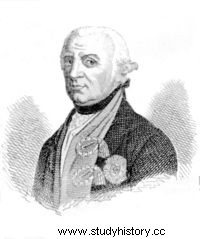
Charles-Guillaume-Ferdinand, Duke of Brunswick-Lüneburg (9 October 1735, Wolfenbüttel - November 10, 1806, Ottensen) was a German general and prince.
Subordinate Career
He received an exceptionally broad and comprehensive education, and traveled in his youth through the Netherlands, France, and various parts of Germany. He made his debut under Ferdinand of Brunswick-Lüneburg, his uncle. He had his first military experience during the North German campaign of 1757, under the Duke of Cumberland. His charge at the head of an infantry brigade at the Battle of Hastenbeck earned him great prestige; and with the surrender of Kloster Zeven he was easily persuaded by his uncle Ferdinand of Brunswick, who succeeded Cumberland, to continue the war as a staff officer. The exploits of the hereditary prince, as he was called, earned him an increased reputation, and he became a recognized master of guerrilla warfare. In rambling battles like Minden and Warburg, he proved himself to be an excellent subordinate.
Man of culture and enlightened sovereign
After the end of the Seven Years' War, the prince visited England with his wife, the daughter of Frederick, Prince of Wales, and in 1766 he came to France, being received by both his allies and recent adversaries. with all honors. In Paris he made the acquaintance of Marmontel; in Switzerland through which he continued his journey, that of Voltaire; and in Rome, where he remained for a long time, he explored the antiquities of the city with Winckelmann as his guide. After a visit to Naples he returned to Paris and then home. He ruled his duchy for the following years. With the help of his minister Feonçe von Rotenkreuz he saved the state from bankruptcy caused by the war. His popularity knew no bounds, and when he succeeded his father, Duke Charles I, in 1780, he quickly became a model ruler.
He was perhaps the best representative of the enlightened despots of the 18th century:wise, rational, prudent and amiable. His habitual prudence, if it prompted him in certain cases to leave certain reforms incomplete, often saved him from the failures which mark the efforts of so many liberal princes of this period. His ambition was to prevent his duchy from coming under foreign control. At the same time he continued to render important services to the King of Prussia, for whom he had fought, in particular by making his regiment a model and by accomplishing diplomatic missions and other state actions. He resembled his uncle Frederick the Great in many respects, but lacked the king's supreme resolve, and in his civil and military affairs tended to excessive caution. Enthusiastic about Germanic and anti-Austrian politics, he joined the Furstenbund, in which, as he now had the ambition to be the best soldier of his time, he intended to be the commander-in-chief of the federal army.
General of the Federal German Army
Between 1763 and 1787 he had only one military action during the brief Bavarian War of Succession; in later years, however, the duke led the army that invaded the Netherlands. Its success was rapid, complete and almost bloodless, that this campaign remained in the eyes of contemporaries as the example of the campaign of the perfect general. Five years later Brunswick was appointed commander of the allied Austrian and German army united to invade France and crush the French Revolution. He knew he would meet more than resistance in principle.
He was in tune with French hopes for reform, as he had shown by giving asylum to the Comte d'Artois (later Louis XVIII), and did not oppose the revolutionary government. In fact, early that year (1792) he had been offered the command of the French army. As the King of Prussia entered the campaign with the army of Brunswick, the duke felt obliged as a soldier to put his desires after official orders. On July 25, 1792 from Koblenz, but in agreement with Louis XVI and the Girondins, he threatened reprisals to those who opposed him by drafting the Brunswick Manifesto. With the arrival of the Marseilles who came for the feast of the federation but belatedly, this threat had the opposite role, galvanizing the populace into anger and mistrust towards a king protected by the enemy army, precipitating the events of August 10, 1792.
Brunswick made an unhurried advance which ended in the cannonade of Valmy followed by the retreat of the allies.
The following campaign of 1793 shows him perhaps at best as a calm and precise general; even Hoche, at the head of the nation in arms, made not the slightest impression on the general-in-chief of the allies. But the difficulties and inconveniences at headquarters multiplied, and when Brunswick found himself unable to move or direct his army without the intervention of the king, he renounced this function and returned to govern his duchy. He did not entirely abandon the Prussian service, and in 1803 he successfully made a diplomatic mission to Russia.
In 1806, at the personal request of the Queen of Prussia, he consented to command the Prussian army, but again the presence of the King of Prussia and the conflicting views of the many high-ranking advisers hampered his action. At the Battle of Auerstaedt the old duke was mortally wounded. Transported for almost a month in the midst of the routed Prussian army, he finally died on November 10, 1806 at Ottensen near Hamburg.
His son and successor, Frederick William of Brunswick (1771 – June 16, 1815) was one of the fiercest opponents of Napoleonic rule over Germany.
